Post hidden under the cut due to graphic depiction of self-harm and childhood sexual assault. Please mind the trigger warnings.
I had planned to go over at least two more topics of social justice concerns to me (race representation and survivor representation) but in the break after posting my first set of notes it became clear to me that a lot of folks have questions about the demons in this story, questions that I didn't adequately address the first time through. This is a fair ask, and the only explanation I can give is that this is what Gendercide books are like now: the second-to-last gendercide I read (Sleeping Beauties) had literal Eve from the Christian creation causing the gender plague, so when creatures escaped from a Hieronymus Bosch painting show up as demons in this one, I just sort of took another bite of peanut butter sandwich and nodded sagely. But questions about the demons are relevant here because they pertain to whether the Y chromosome really does contain all the world's "evil". So let's begin.
To begin with, there's not a lot to go on regarding the demons and the demon world: as I mentioned previously, the glimpses of the demon world only fill about ~15 pages of this 270 page novel. Those pages are between-chapter breaks that seem to take the guise of some sort of "found footage" documentation that I initially took as government research, though I'll admit that feels strange now in light of the reboot ending where time is wound back and the event didn't happen, therefore the documents should not exist to be read. Outside of these pages of found documents, our only glimpses into the demon world occur when the characters watch "The Men" live-stream videos in their narrative sections.
[TW: Suicide] The first character to hear about "The Men" website is Alma, who receives 10 email messages from her mother's email account. Alma's mother has died by suicide on the same night of the event, which made me briefly wonder if she was supposed to be one of the Burning Girls as a narrative link to the mystery of the lost women, but we are later told how she died and immolation was not a factor.
Our first of the found documents follows and shows the men getting up and leaving their places on earth. I'll admit I find this very confusing because the disappearances have previously been described as a sort of Rapture: all women felt a moment of pure bliss, then looked around to see their men gone. Being in mind of a Left Behind rapture scenario, it was strange to learn that the men instead walked out of their homes into hell. Even presuming the demons (the strange bird in #3 is one of the demons) unlocked the prison doors or caused the men to phase through material concerns like prison bars, how would walking like this work for disabled people who can't walk? people in comas? actual fetuses in wombs? Are we to understand that a second trimester fetus just phased through the womb walls and walked off? I do not know.
Chapter 6 opens with people discussing The Men so we can see a glimpse of what an internet forum thinks of the footage. This is noteworthy in part because we are still in the short 10-day window in which the world briefly suffers energy shortages and gasoline rationing because of the disastrous effect of half the world's labor being raptured overnight. Yet everyone still has unlimited social media access and video streaming capabilities--as well as the time and inclination to discuss the newest online "prank".
We never learn why Alma clicks on the spam email message from her mother; she thought it likely that her mother had been hacked, and having the message sent 10 times seems suspicious, but I guess having your personal information potentially stolen seems less of a threat in the apocalypse. Alma begins obsessively watching the footage. The mechanics of this are unclear; she's described as watching the site "all day, every day" which would suggest a live feed (like a zoo-cam) but the videos are described as discrete and separate drops with "credits" each time. When another POV character (Blanca) sees the site with Alma, they realize that the "actors" are real.
Between chapters 6 and 7 we see that "the men" are being forced to walk under the piercing eyes of their strange captors. They appear to be in some sort of hypnotic state which a single trans woman will briefly shake herself slightly out of, but I don't believe this is ever repeated in the novel so the significance of the scene is lost on me.
Chapter 8 begins with another POV character (Ji-Won) who has become a volunteer trucker. The opening to her chapter is interesting because it is the only mention of violence in the "world of women" that I can recall, excepting the scene where the trans man is attacked in the wake of the rapture. We read: "The roads were still hazardous. Through Nevada and eastern California, there were towns with no food supplies or water, and some truckers had been ambushed and killed."
What does this mean? Well, one possible explanation is that evil doesn't in fact dwell on the Y chromosome and the demons (or Poppy) were mistaken (or lying) when claiming that this event would remove evil from the world (or perhaps that the author draws a meaningful difference between the manly "Evil" taken to hell and the womanly evil left behind). On the other hand, these incidents as so vague that it's hard to be sure that "evil" is the best explanation: it sounds like people are ambushing the truckers for *food and water* and I'm not sure where that action falls on my personal morality meter. Moreover, it is entirely possible that this is just another world-building tangle in a book full of them: Ji-Won is proud of her "unlimited gasoline permit" in a time of gas rationing, but Jane and Evangelyne will later be able to charter a private plane when their commercial flight is canceled for mundane reasons. There are a lot of these snarls, such that I found it a real struggle to tell what was rationed, what was utopianly plentiful, and what was merely normally available.
But I digress. Ji-Won is given a flyer informing her of the existence of "The Men" and another woman urges her not to get caught up in what she believes to be an exploitative cult. The woman is a caricature: she's casually racist, she doesn't understand art techniques the way Ji-Won does, she thinks the men on the screen are women in costumes. Ji-Won gets hooked on the site and becomes part of the online community.
The next set of "The Men" clips are even harder for me to interpret; I freely admit to being too autistic and literal-minded to pierce the gnomic imagery here. What is apparent is that the prisoners are being tortured by the creatures and that time is passing much differently from time on earth: they are forced to stand, hungry and unfed, for days on end while waiting for...something? They are skeletally thin but cannot die.
The interlude before chapter 10 introduces a major plot element which I will describe the best I can. A research group wants to identify the missing in the videos, but apparently doesn't think to use image recognition software against volunteer-submitted photos. Instead, they enlist volunteers to watch in individual sessions or group viewing teams to see if they recognize anyone. The study found that the group viewing sessions were more productive than the individual sessions (which seems like normal economics of scale to me? but?) leading to the conclusion that the clips are actually somehow magically showing viewers who they want to see, with larger demand having more weight.
This is important because if the demons are running Eurovision: Hell Edition where "more attention" means "more screentime" for specific men (specifically the men missed by our protagonists) then we have some support for the author's claim that "the book is about women who can't let go of the men they've lost, and devote their lives to getting them back." It's just that the "devote their lives to getting them back" means that the women sit around and watch the live-stream from their couch all day, whereas I was expecting something a little more active.
Moreover, if Poppy is when she says that Lot's Wives looking back with pity on the men will draw them to the door back to earth, then we may speculate that the demons are tailoring the video feed on purpose to the most piteous viewers. Why? Do they want their side of the bargain to hit the contract catch so that evil is back to run free on earth and the Burning Girls die in vain? Or are they disinterested alien observers who just want to see what happens?
[TW: Child Death, Racism] Alma learns of the findings of the research paper and hosts an open house slash viewing party at her mansion and people walk, drive, and fly in to Los Angeles for the event. This puts all the POV characters in the same room when the men are forced (?) to kill and eat a child in order to satiate their hunger. The narrative takes pains to note that the first group to feed are Black men.
Jane, who has never seen "The Men" feed before and is here on a political campaign stop with her girlfriend Evangelyne, is distressed to see her son eaten by men--and each of the men are ones she has met at least once in life.
Evangelyne leaves the viewing party and declares the site a hoax that must be ignored at all costs. (She suspects the truth due to the letter she received from Poppy and fears undoing the event, knowing that the event saved her life from impending police violence by rapturing away all the policemen at once.) Jane moves in with the other POV characters and they begin the "Netflix marathon" segment of the novel. The hellscape slowly changes to a vision of the ruined world that mankind is destined to create if men are allowed back into the world. (Note: the "guards" are there to protect Jane from people Evangelyne falsely claims created the child-death clips specifically in order to terrorize her girlfriend.)
Though the women cannot stop watching their men, they confess to each other in the tense nights when they are hot and tired that they don't actually want their men back.
[TW: Detailed CSA] I haven't gotten into this before because it's pretty heavy and I was saving it for the survivor rep I wanted to talk about, but it has to be mentioned now for the scene to make sense: Jane was sexually groomed as a young teenager by her ballet mentor (Alain). He made her seduce younger men, lay on a bed, and let them fuck her while Alain watched and masturbated later. When Alain was finally arrested, the FBI arrested and charged Jane as an adult accomplice in order to force her testimony against him. She had been 18 years old at that time; the youngest victim had been a 13 year old boy.
[TW: CSA] The trial is a major part of Jane's backstory and the ruin of her life. She is put on a sex offender list and is hounded by what I can only describe as a ludicrous version of "cancel culture" for the rest of her life: people recognize her in the street and threaten her as a regular part of her daily life, especially after the newspapers are pressured to stop running her innocent childish mugshot and replace it with a photo from the ballet troupe where Jane is wearing thick stage makeup. People attack her online and when Jane tries to explain that she comes from a poor family (rather than the fact that she was a child victim like the other victims???) she is hurt when tiny violin gifs receive 1,800 likes in response to her heartfelt explanations.
[TW: CSA] Jane married her husband (Leo) when she was 19 and he was 38 because he seemed safe and protective and didn't blame her for her past, and that seemed like an escape to her. Now, watching "The Men", she realizes that while she never hated her husband (no, not even when he quietly cheated on her during her emotional affair with Evangelyne in college) she now resents all the men in her life for never protecting her. Okay. But then Jane reveals that she resents the younger-than-her boys that she seduced for Alain but who didn't defend her "when I was prosecuted for rape".
[TW: CSA] What a difference passive voice makes, because really that sentence ought to be written as "said not a word in my defense when I was prosecuted for raping them when they were thirteen and I was eighteen." Look, I'm a survivor of rape and childhood sexual assault. I don't blame Jane for being groomed and abused, and I'm not going to say that victims can't have complex, ugly feelings about what happened to them. But this is a hell of a thing to say in a novel that posits the question of whether men are capital-e Evil, this idea that a thirteen year old boy is Evil because he didn't defend his rapist.
[TW: CSA] We live in a culture which does NOT take rape against men/boys seriously when the rapist is a woman, and this kind of thing is not helping. Jane has had a lifetime to come to terms with the fact that while, yes, she is a victim of grooming by Alain, she is still guilty of seducing and raping children who were incapable of consent. Her youth and circumstances should be taken into account when considering how society should respond to her, yes, but NOT when considering how her *victims* should respond to her!
[TW: CSA] Oh, and to add to the muddy racial dynamics in this book, Jane is a white girl and many/most of her victims were boys of color that were foreign exchange students to the ballet troupe so that Alain could send them back home after the rape and avoid detection and prosecution in the United States for as long as possible. These are the victims that she's now angry wouldn't "fight" for her, to protect her. But they are given no space to be angry that Jane didn't fight to protect them, neither then nor now.
Back to the live-stream, the missing begin to reach the Door that they have been drawn to by the force of the attention shown to their videos. There is a curious implication in #1 that when the men step back into the human world their corresponding watcher(s) disappear at the same time, which suggests that the women are themselves in a dream world and that the return of their men wakes them up before the event, as Jane does later. But this doesn't really seem to go anywhere, as Jane is the only one who remembers the event when she wakes up.
We get an extended flashback from Evangelyne about Poppy, most of which you already know. Here are her descriptions of the demons and the Door and the deal again, just to have all the metaphysics in one post.
At the end of the flashback, Leo emerges from the demon world. The world fades around her and then Jane finds herself back at the very moment before the event, her husband and son safe at their campground. By allowing the men to return--by giving them womanly attention in order to draw them out of hell--the deal has been broken with the demons. The Y chromosome victims will not be taken after all and the Burning Girls have died in vain; they will not be resurrected, which means 1,000 mentally ill women and girls are now dead in the background noise.
Were the demons right? Are people with Y chromosomes evil and destined to ruin the world? Jane seems to think so, to think that without Evangelyne "the dead lands in The Men" would be the fate of the world. But does Jane know that as a fact? Is Jane a reliable narrator? We don't know, and that's all I have in terms of textual clues.
My personal read: I believe we are supposed to take the "world of women" as a soft utopia, by which I mean there are still some individuals capable of wrong, some powers capable of evil, some natural disasters capable of destruction and death, but that Good now has the power and weight to come out on top. I believe we are meant to see the removal of "The Men" as a sort of efficient route to paradise, that once "The Men" are out of the way and obstructing progress, "The Women" can knuckle down and get things done. When the disappearances are described in chapter 1, we get this: "Too few women on this committee. Another board of directors with no women. Men making decisions about women's bodies."
I believe we're meant to see the disappearance of "The Men" as a vacuum of power into which "The Women" can finally step. The idea that *women* are just as capable of "making decisions about women's bodies" as men are does not seem to occur to the author, nor does it play out in this world; after a few setbacks of natural disasters and labor shortages, the world improves just as the book teaser promises. The world becomes better without Y chromosomes in it, just as Poppy envisioned and the demons promised.








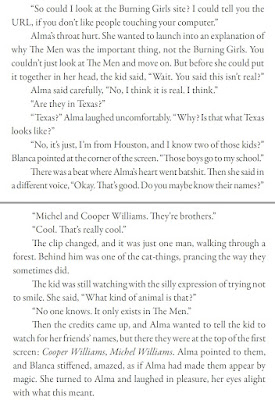
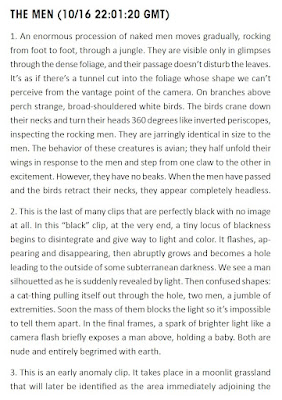

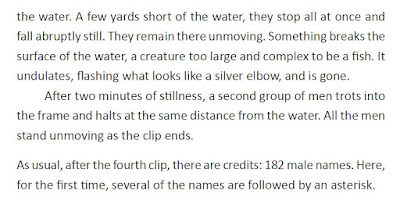


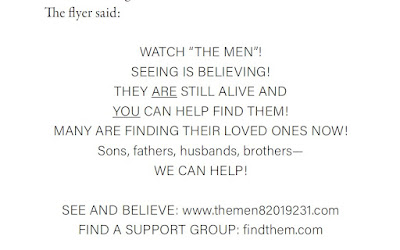


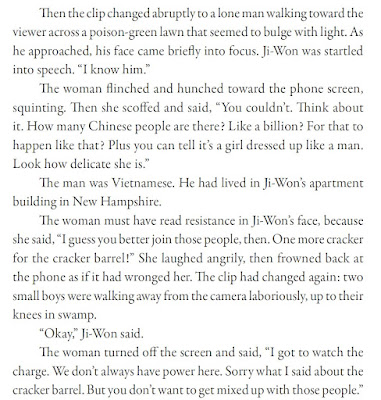

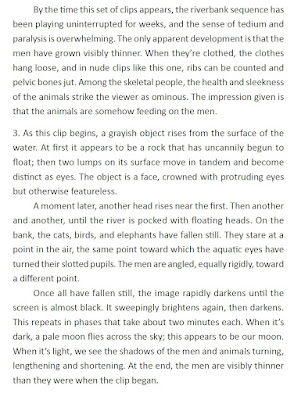




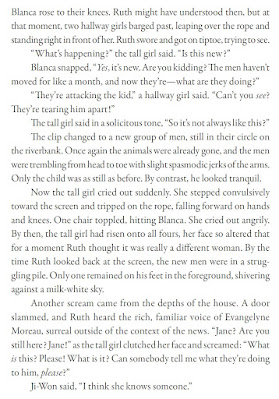




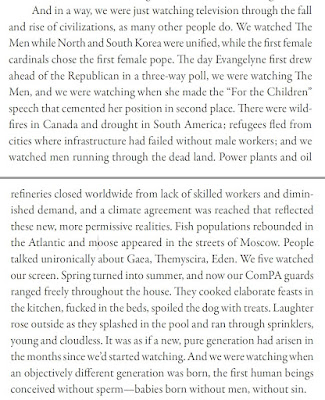


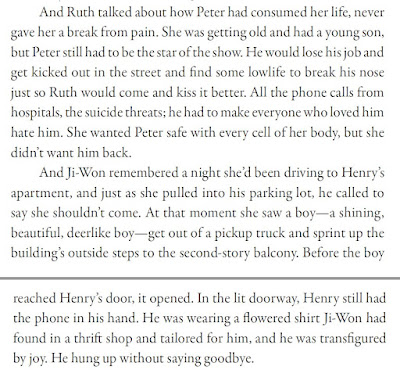
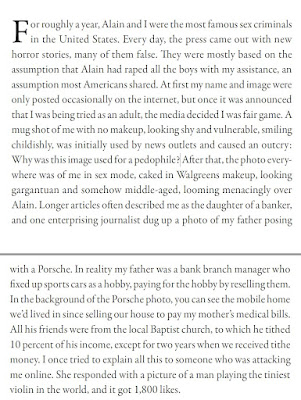
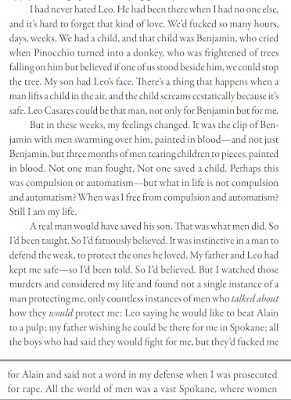
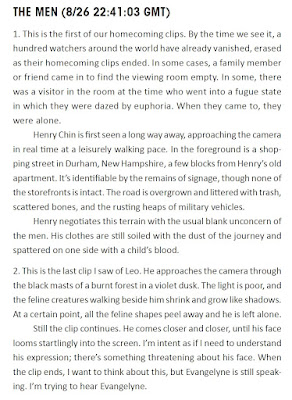
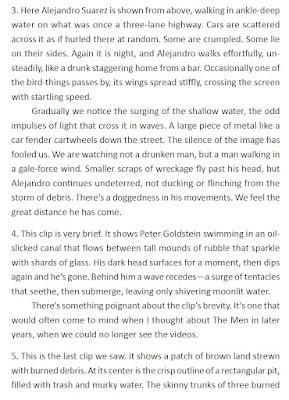


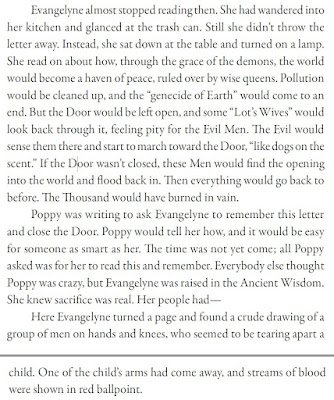
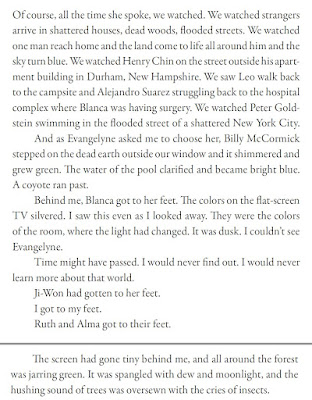
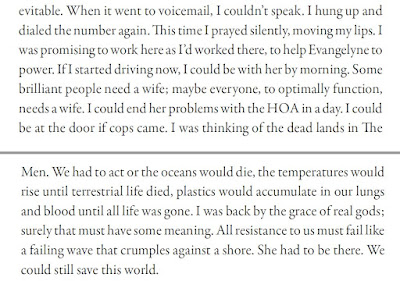


0 comments:
Post a Comment